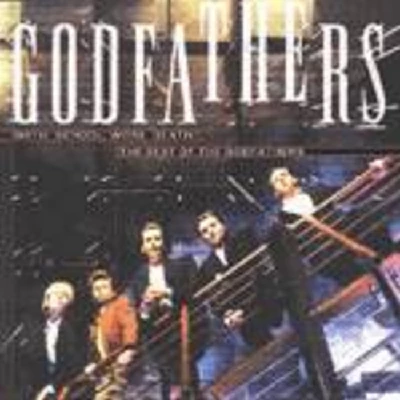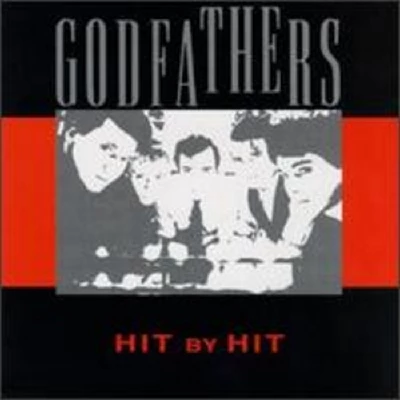Godfathers
-
Songs about Love and Hate : An Intro
published: 13 /
1 /
2002

When ‘The Godfathers ‘ first emerged in the mid nineteen eighties, their hard-edged and abrasive wound immediately attracted the interest and enthusiasm of many music journalists and critics. The Sout
Article
When ‘The Godfathers ‘ first emerged in the mid nineteen eighties, their hard-edged and abrasive wound immediately attracted the interest and enthusiasm of many music journalists and critics. The South London band were essentially a New Wave outfit , but were also influenced by fifties American rock ‘n’ roll groups and powerful British bands from the sixties such as ‘The Who’, ‘The Kinks ‘and ‘The Small Faces’. For three years, between 1988 and 1991, The Godfathers’ mainstream success seemed imminent. Despite heavy promotion from major record label, Epic, and a lot of press coverage and radio airplay, the band, however, proved to be too out of vogue with the ‘Madchester’, ‘Acid House’ and Goth fashions of the time. They remained a critics’ act, never quite capturing the attention of the general public and their breakthrough into the public sector never came.
Interest in The Godfathers in recent years has dwindled and waned, and they have been through many different line-ups. There have, however, now been seven albums on three different labels, including two on their own Corporate Image label, and the group, who have always been a good live act, remain to this day a forceful and regular fixture in small clubs and halls, much respected by a regular if deprecated fan base. They are a band who have suffered many of the indignities of the music business and have fallen victim to many of its pitfalls, yet as lead singer, Peter Coyne, who with his brother, bassist Chris,is the nucleus of the group, has told ‘Q’ magazine in a recent interview they remain, almost fifteen years on from when they first formed, " passionate" about their music.
Both Coynes were brought up in a large Catholic family, and , like Ray and Dave Davies, who were the last of eight, are the youngest of several siblings."Me and Pete had six sisters and two brothers" Chris Coyne would reminiscence to the Calgary Herald in 1989."They were bringing records from the fifties, the golden period of rock ‘n’ roll, and then the sixties and the early seventies. It was like an instant music college at home." It was, however, punk, and ‘The Sex Pistols’ in particular, that were to prove at least initially the predominate influence on the young Coynes .
By the early eighties, they had formed with guitarist Del Bartle and drummer Kevin Murphy their own punk outfit ‘The Sid Presley Experience’. The Sid Presley Experience released two singles, ‘Hup 2-3-4’ and a cover of John Lennon’s ‘Cold Turkey’ in 1984 . Both records were self-released, the former on ‘I.D. Eye’, and the latter the sole release of the self-named Sid Presley Experience label. The group also toured with Billy Bragg on his eight date ‘Jobs for Youth’ tour of Britain in the same year. These shows were sponsored by the British Labour Party,which was out of power to Margaret Thatcher’s Conservative government at the time, and were backed by in between sets speeches from some of the leading Opposition politicians of the era.
The Sid Presley Experience, however, was notable as much for its in-fighting as for its music or its politics, and regular and often physical confrontations took place between the Coynes on one side and Bartle and Murphy on the other.
The inner quarrels would lose them at least one major deal. At one show, top producer Trevor Horn, who had just had a trio of British number one hits with ‘Frankie Goes to Hollywood’ including the radio-banned ‘Relax’, turned up looking for an equally controversial successor to sign to his ‘ZTT’ label. "The band", as Peter Coyne would tell The Sacramento Bee five years later in 1989, however," had a big argument before going on stage, and then there was a fight on stage. And then there was a big fight afterwards." The producer perhaps not surprisingly left hastily and without signing anything. "He was looking for something provocative" the vocalist would joke in the same interview "but I don’t think he wanted the real thing."
Rock star egotism seems to have been the real cause of the conflict within the band. As interest began to develop in The Sid Presley Experience, and the quartet gained increasing exposure on British television and radio, arguments started to take place over the band’s work ethic, with the Coynes wanting to work to a harder agenda than the others.
By the summer of 1985 the fights had escalated , and ballooned to a point in which Bartle and Murphy, as Peter Coyne would again tell The Sacramento Bee in 1989,"wouldn’t show up to rehearsals, interviews or concerts." The group split up , and the Coynes, briefly keeping the Sid Presley name tag, got together with guitarists Mike Gibson and Kris Dollimore and drummer George Mazur to form a new line-up of the band. All three musicians were friends of The Coynes and had been long-term regulars in other acts on the live circuit in London. There were three months of rehearsal, and then the new group went off on its first tour of America.
In the final twist in The Sid Presley saga, Bartle and Murphy, however, formed their own version of the band ‘The New Sid Presley Experience’, and sued. In the ensuing legal chaos that followed, both bands lost the rights to the name. The Coynes, in affinity with one of their favourite actors, James Cagney, and after the Mario Puzo book and 1972 film, renamed their new act The Godfathers. The line-up of the Coynes, Gibson, Dollimore and Mazur would be the longest lasting and most definitive of all the Godfathers’ many incarnations. Bartle and Murphy would go on to form with singer ‘Mad Dog’ Lucas a new group ‘The Unholy Trinity’, which would stay together to release an eponymous seven track album at the end of 1985 and then also split.
The Godfathers’ first single ‘Lonely Man’ was put out six months after the new band had got together at the tail end of 1985, and was released, like all the early Godfathers releases, on the band’s own Corporate Image label. It was followed quickly by two more singles in 1986, ‘This Damn Nation’ and ‘Sun Arise’. ‘Lonely Man’, about lost love and friends, had an echoing fifties riff and rattling drum breaks, and was a typically energetic and forceful debut. ‘This Damn Nation’ was more punkish, with frenzied police-siren style guitars, and an angry and vituperative vocal about an unemployed friend of a friend’s suicide. ‘Sun Arise’ was in complete contrast a cover of a 1962 Rolf Harris song. Originally recorded hastily at a radio session, in which the band had been encouraged to play as well as their own numbers something completely unexpected and out of the ordinary, it proved so successful that the group decided to rework it as a single.
All three records were recorded, as all subsequent Godfathers recordings were to be over the next four years, with Vic Maile. Maile had been a sound engineer in the sixties, working with acts such as The Who and The Kinks, but by the seventies had branched out into production. Much of his production work has a rough-edged quality, and his other credits include Brinley Schwarz’s ‘Don’t Ever Change’ ; Motorhead’s live album ‘No Sleep ’Til Hammersmith’ ; Dr Feelgood’s ‘Malpractice’, and The Screaming Blue Messiah’s ‘Gun Shy’ and ‘Bikini Red’.
At the end of 1986, the band put out their debut album, ‘Hit by Hit’. It gathered together all the three first records, the six ‘B’ sides which- two apiece-had made up the twelve inch versions of the singles, and also another re-recorded version of ‘Cold Turkey’. While offering little new to those who had been fans of the Coynes since the days of The Sid Presley Experience, it was an excellent summary of the band’s career so far, and made an otherwise auspicious and powerful first album. Other highlights, as well as the singles, included ‘Can’t Leave Me Alone’, a frantic rock ‘n’ roll song which balances handclaps and wild screams from Peter Coyne with a ‘Grease’ style backing chorus from the rest of the group ; the anthemic desperate longings of ‘I Want You’ and a ‘Peter Gunn’ style instrumental track ‘John Barry’.
The band by this stage were also beginning to gain a reputation as a good live act, the energy and rawness of their studio recordings naturally consolidating in concert halls and arenas. They were in these early days regularly playing a hundred and fifty to two hundred shows a year, and in these first few years would tour, as well as Britain and America, Australia and most of the other countries in Europe. The highlight of the Godfathers’ live calendar, however, quickly became their yearly St Valentine’s Day Massacre gigs, which always took place in London, and had the band every February 14th reenacting the famous nineteen twenties Chicago mobster shoot-out by coming on stage carrying fake machine guns and spraying the audience with blank bullets. The first of these shows took place at the London Dungeon in 1986 and they remain to this day a popular and annual fixture.
Interest also began to shown by the press in The Godfathers’ unique appearance and dress sense. The group always wore on stage, and at most of their interviews and photo shoots, expensive jewellery and designer suits. Part of it was undoubtedly image, but as Mike Gibson would explain in an interview with The Chicago Tribune in 1988 there was another purpose to this as well. " do like to get dressed up, spruced up for a special night out. And I think it’s nice to approach every gig as a special night. It’s really bad if a band just stumbles on stage without making any effort towards their appearance. What you do when you prepare for a gig is heighten the sense of occasion, increase the tension, make it more of an event."
Some critics too started to accuse the band of likening themselves to real-life gangsters, and the Coynes in particular of basing themselves on the Kray Twins, the celebrated London gangster icons and double murderers of the nineteen sixties. It was an image that the band would frequently try to disssociate from." We’re kindly godfathers" Peter Coyne would tell the Associated Press as early as 1986. "Godfathers in the other sense of the word. We don’t want to come across as heavy or intimidating." The band’s aggresive sound and their often vitriolic lyrics ; the two brothers spearheading the band and the brawling backdrop of their Sid Presley Experience past would, as well as the suits and their choice of name, however, make such comparisions both inevitable and predictable. It is a concept that the group has never fully managed to escape from, and would be only the first of the band’s several brushes with controversy.
In 1987 the band released their last single on the Corporate Image label, their most poppish record yet ‘Love is Dead’. It was released with typical Godfathers cynicism and black humour, just in time for their second St Valentine’s Day Massacre show, on February 14th. By now the band had started to attract the interest of the major labels and later on that year they signed to Epic Records, one of the American branches of CBS.
Band Links:-
http://www.godfathers.uk.com/
https://www.facebook.com/TheGodfathers
Have a Listen:-
Picture Gallery:-
